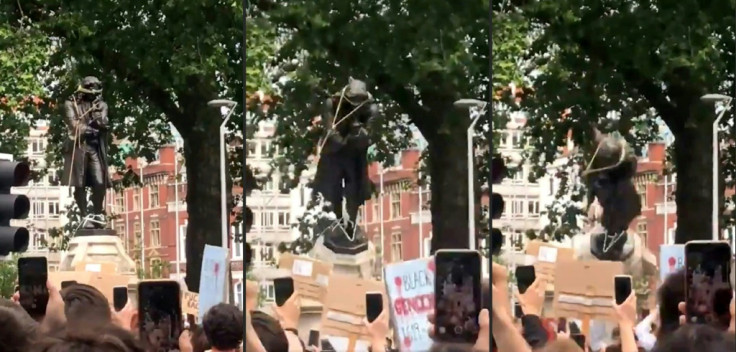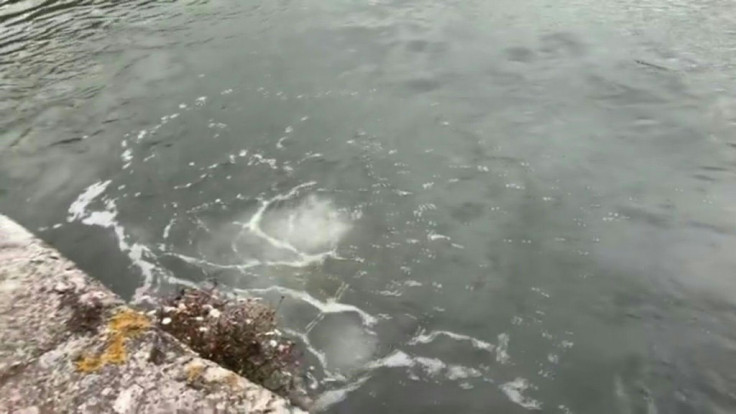UK anger at toppled slave trader statue but few want it back
The action won some support, including from the city's mayor.
The British government on Monday denounced the toppling of a slave trader's statue during anti-racism protests, urging campaigners to use democratic means for change rather than breaking the law.
But the action won some support, including from the city's mayor, against a backdrop of public pressure to re-examine representations of the country's colonial past.
Demonstrators pulled down the 18-foot (5.5-metre) bronze monument to Edward Colston in the southwest English city of Bristol and threw it into the harbour on Sunday.
The protest was one of many across Britain in recent days in response to the death of George Floyd, an unarmed black man, at the hands of police in the United States.
Most marches were peaceful but there were flashes of violence, including in London, where the statue of World War II leader Winston Churchill in Parliament Square was defaced.
Prime Minister Boris Johnson condemned the clashes, which saw 36 people arrested and 35 police officers injured, as "a betrayal of the cause they (protesters) purport to serve".
Johnson's spokesman told reporters on Monday the violence was "unacceptable", while the removal of the statue in Bristol was a criminal act that should be prosecuted.

"We fully understand the strength of opinion but in this country we settle our differences democratically," he added.
Colston, who came from a wealthy merchant family, was a former top official in the Royal African Company in the late 17th century.
The company sent into slavery hundreds of thousands of men, women and children from West Africa to the Caribbean and the Americas. Many were branded with the company's initials.
Colston was also a Tory member of parliament and philanthropist, donating huge funds to support schools, hospitals, almshouses and churches in Bristol.
Historic England, a government heritage body, said the local community must now decide what to do with the fallen statue but "we do not believe it must be reinstated."
"We recognise that the statue was a symbol of injustice and a source of great pain for many people," it added.

Authorities had agreed to rename his statue, which was erected in 1895, to highlight his role in slavery but the process became deadlocked because of conflicting views.
Marvin Rees, Bristol's elected Labour mayor, said he believed the statue would end up in a museum, alongside banners from Sunday's Black Lives Matter protest.
Rees, who is of Jamaican heritage, said he "cannot condone the damage" but described the destruction of the statue as an "iconic moment".
"I cannot pretend it was anything other than a personal affront to me to have it in the middle of Bristol, the city in which I grew up," he told BBC radio.
Leading Bristol music venue Colston Hall, which has hosted concerts from Louis Armstrong to The Beatles, said Sunday's protests had spurred it to speed up a plan to change its name.
"The current name does not reflect our values as a progressive, forward-thinking and open arts organisation," Colston Hall said in a statement.
"We want it to be representative of the city, a beacon of its values of hope, diversity and inclusion."
Bristol trip-hop outfit Massive Attack have consistently refused to play at the venue because of its name and associations.
British institutions and local authorities have in recent years been re-examining their public monuments in the face of demands to better represent the country's colonial past.
Churchill's legacy has come under scrutiny for his wartime policies that are blamed for the death of millions during famine in the Indian state of Bengal in 1943.
"No debate about the way we run our public spaces should ever be finished," mayor Rees said. "We should be constantly wrestling with who we are and where we've come from."
British Formula One driver Lewis Hamilton called Colston a "monster" and urged all similar statues to be torn down.
"The only disease right now is the racism that we are fighting," Sterling said.
Copyright AFP. All rights reserved.
This article is copyrighted by International Business Times, the business news leader





















